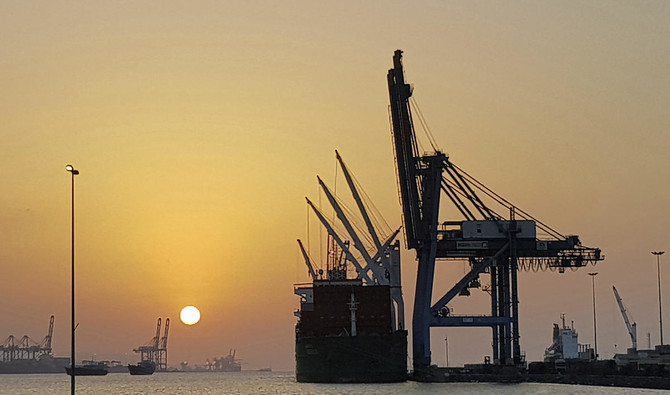Djibouti: Two fighter jets took off and roared over the Djibouti-Ambouli International Airport, a sprawling complex in this tiny African nation that is quickly becoming a strategic military and shipping outpost for the world.
Not far away, a massive US flag waved over transport planes parked in front of America’s only permanent military base in Africa, Camp Lemonnier, home to about 4,000 personnel.
Djibouti, an arid Horn of Africa nation with less than 1 million inhabitants, also has become a military outpost for China, France, Italy and Japan, with that nation’s first overseas base since World War II. Other powers including Saudi Arabia have expressed interest in the key location across the Bab el-Mandeb strait from the Arabian Peninsula and on one of the world’s busiest shipping corridors.
On the chaotic streets of what has been called the “Singapore of Africa,” the jostling between the United States and China for influence is plainly seen.
Before his firing by President Donald Trump, then-Secretary of State Rex Tillerson made a point of stopping in Djibouti on his Africa visit last month and noting its importance in the fight against the Al-Qaeda-linked Al-Shabab extremist group in neighboring Somalia and the Daesh group in the region at large. The US carries out drone missions in Somalia and Yemen from Djibouti, but the military paused air operations last week after a jet crashed and a helicopter was damaged during a landing.
China’s first overseas military base, which was manned last year, is just a few miles from the US one. The head of the US Africa Command, Gen. Thomas Waldhauser, earlier this year predicted that “there will be more.”
China’s economic interest is strong as well, with Djibouti borrowing up to $957 million from the Export-Import Bank of China to finance several projects in recent years, according to the China Africa Research Initiative at Johns Hopkins University. The Chinese built a new electrified rail line that links the capital of neighboring Ethiopia, Africa’s second most populous country and one of its strongest economies, with Djibouti as the nation aims to become a global shipping power.
“We sit on two of the busiest shipping lanes in the world. We are servicing the wider region, including some of the world’s fastest-growing economies,” the chairman of the Djibouti Ports and Free Zones Authority, Aboubaker Omar Hadi, said in an interview during a recent visit by The Associated Press.
He called Djibouti, a largely Muslim nation, a model of stability in an otherwise volatile region. It is also one of the world’s fastest-growing economies, with the World Bank projecting 7 percent growth this year.
The country made headlines earlier this year when it seized control of a container terminal run by the Dubai-based DP World, one of the world’s largest port operators, in a long-running legal dispute. If China takes over the terminal’s operations, the effects on supplying the US military base could be “significant,” the US Africa Command chief has warned.
That will not happen, Hadi’s office said: “Djibouti has no plan to give Doraleh Container Port to China.” It is now managed by a fully state-owned company controlled by the ports authority, it added.
Djibouti is currently investing $15 billion in local infrastructure projects that connect the region to global trade routes, including the expansion of ports, improved road and rail links and new airports, according to official figures provided to AP.
The country’s ports now have a total handling capacity of 18 million tons per year, officials said, and the new Doraleh Multipurpose Port, a $590 million joint project between the ports authority and China Merchants Port Holdings opened in May last year, is already working at full capacity. It is a separate entity from the Doraleh Container Port.
Now officials are pursuing a new project called the Djibouti International Free Trade Zone, expected to be the largest of its kind in Africa.
“Once complete it will span an area of 4,800 hectares (11,860 acres), following a total investment of more than $3.5 billion,” the ports authority chairman said. The first phase is expected to be complete by the end of the year.
Officials hope the ambitious infrastructure projects will not only raise Djibouti’s global image but also help it pay off significant debts.
During Tillerson’s visit, Foreign Minister Mahamoud Ali Youssouf acknowledged that Djibouti’s debt totals roughly 84 percent of its GDP, most of it to China. “The burden of debt is there, we are aware of it,” he said. “But let me tell you that it is so far manageable.”
One sign of investor confidence is whether China’s commercial banks begin lending to Djibouti as well, said Jyhjong Hwang, senior research assistant at the China-Africa Research Initiative.
Djibouti’s officials anticipate that the demand for their ports will grow as more African nations expand their economies. They also dismissed concerns about a recent deal by DP World, Ethiopia and Somalia’s semi-autonomous region of Somaliland to develop and manage the Port of Berbera there, seen by some as another reason for Djibouti’s seizure of the container terminal from DP World.
“Competition will make the region more attractive. East Africa’s economies are growing fast, and there is a clear demand for Djibouti’s infrastructure to support this growth,” the ports authority chairman said.
Djibouti’s residents said local business is booming as a result of the growing international military and shipping interest, despite the country’s unemployment rate of nearly 40 percent, and construction sites and new roads dotted the city. Economic growth has attracted entrepreneurs from India, Yemen, Gulf nations and elsewhere.
“Our company provides a fleet of cars for the army bases and we are really benefiting from it,” said Nour Omar, one of Djibouti’s best-known businessmen and general manager of local import and distribution business BSH Holding. “We aim to expand our services following their demand.”
Tiny Djibouti aiming to become global military, shipping hub
Tiny Djibouti aiming to become global military, shipping hub

- Djibouti, an arid Horn of Africa nation with less than 1 million inhabitants, also has become a military outpost for China, France, Italy and Japan.
- On the chaotic streets of what has been called the “Singapore of Africa,” the jostling between the United States and China for influence is plainly seen.
Brazil’s Lula urges Trump to treat all countries equally

NEW DELHI: Brazil’s President Luiz Inacio Lula da Silva urged Donald Trump on Sunday to treat all countries equally after the US leader imposed a 15 percent tariff on imports following an adverse Supreme Court ruling.
“I want to tell the US President Donald Trump that we don’t want a new Cold War. We don’t want interference in any other country, we want all countries to be treated equally,” Lula told reporters in New Delhi.
The conservative-majority Supreme Court ruled six to three on Friday that a 1977 law Trump has relied on to slap sudden levies on individual countries, upending global trade, “does not authorize the President to impose tariffs.”
Lula said he would not like to react to the Supreme Court decisions of another country, but hoped that Brazil’s relations with the United States “will go back to normalcy” soon.
The veteran leftist leader is expected to travel to Washington next month for a meeting with Trump.
“I am convinced that Brazil-US relation will go back to normalcy after our conversation,” Lula, 80, said, adding that Brazil only wanted to “live in peace, generate jobs, and improve the lives of our people.”
Lula and Trump, 79, stand on polar opposite sides when it comes to issues such as multilateralism, international trade and the fight against climate change.
However, ties between Brazil and the United States appear to be on the mend after months of animosity between Washington and Brasilia.
As a result, Trump’s administration has exempted key Brazilian exports from 40 percent tariffs that had been imposed on the South American country last year.
‘Affinity’
“The world doesn’t need more turbulence, it needs peace,” said Lula, who arrived in India on Wednesday for a summit on artificial intelligence and a bilateral meeting with Prime Minister Narendra Modi.
Ties between Washington and Brasilia soured in recent months, with Trump angered over the trial and conviction of his ally, the far-right former Brazil president Jair Bolsonaro.
Trump imposed sanctions against several top officials, including a Supreme Court judge, to punish Brazil for what he termed a “witch hunt” against Bolsonaro.
Bolsonaro was sentenced to 27 years in prison for his role in a botched coup bid after his 2022 election loss to Lula.
Lula said that, as the two largest democracies in the Americas, he looked forward to a positive relationship with the United States.
“We are two men of 80 years of age, so we cannot play around with democracy,” he said.
“We have to take this very seriously. We have to shake hands eye-to-eye, person-to-person, and to discuss what is best for the US and Brazil.”
Lula also praised Modi after India and Brazil agreed to boost cooperation on critical minerals and rare earths and signed a raft of other deals on Saturday.
“I have a lot of affinity with Prime Minister Modi,” he said.
Lula will travel to South Korea later on Sunday for meetings with President Lee Jae Myung and to attend a business forum.












